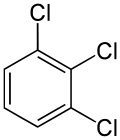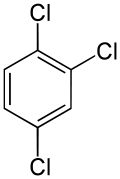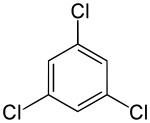Trichlorobenzene
Trichlorobenzene (TCB) may refer to any of three isomeric chlorinated derivatives of benzene with the molecular formula C6H3Cl3.[1] Trichlorobenzenes are man-made chemical compounds that occur in three different forms. Even though the forms have the same molecular weight and molecular formulae, they are structurally different by the positions of the chlorine atoms attached to the benzene ring. 1,2,3-Trichlorobenzene and 1,3,5-trichlorobenzene are colorless solids, but 1,2,4-trichlorobenzene is a colorless oil. The isomers may also have different chemical and toxicological properties.[2][3]

1,2,3-Trichlorobenzene

1,2,4-Trichlorobenzene

1,3,5-Trichlorobenzene
Identification numbers and regulations
- 1,2,3-Trichlorobenzene - EC number 201-757-1, CAS number 87-61-6, substance subjected to REACH Registration [4], added to the list of Submitted SVHC Intentions List[5]
- 1,2,4-Trichlorobenzene[6] - EC number 204-428-0, CAS number 120-82-1, substance subjected to REACH Registration, on 2 Aug 2010. added to the list of Submitted SVHC Intentions List on 2 Aug 2010.
- 1,3,5-Trichlorobenzene - EC number 203-608-6, CAS 108-70-3, added to the list of Submitted SVHC Intentions List on 2 Aug 2010.
gollark: SQLite is open source, you see.
gollark: I have offsite backups of some data, I think ABR's stuff is in there.
gollark: Ah, but I have a *spare* drive right next to it with backups.
gollark: Unlikely, SQLite is very robust, and I have backups.
gollark: I think the most likely scenario is that I lose my data and backup disk.
References
- "Trichlorobenzene (all isomers) [MAK Value Documentation, 1992]". Trichlorobenzene (all isomers). onlinelibrary.wiley.com. 2012. pp. 332–363. doi:10.1002/3527600418.mb1200248isme0003. ISBN 978-3527600410.
- "Trichlorobenzenes". atsdr.cdc.gov. Retrieved 8 June 2017.
- U. Beck, E. Löser (2012). "Chlorinated Benzenes and Other Nucleus-Chlorinated Aromatic Hydrocarbons". Ullmann's Encyclopedia of Industrial Chemistry. Weinheim: Wiley-VCH. doi:10.1002/14356007.o06_o03. ISBN 978-3527306732.CS1 maint: uses authors parameter (link)
- REACH Registration
- Submitted SVHC Intentions List
- "1,2,4-Trichlorobenzene". Sigma Aldrich. sigmaaldrich.com. Retrieved 8 June 2017.
This article is issued from Wikipedia. The text is licensed under Creative Commons - Attribution - Sharealike. Additional terms may apply for the media files.